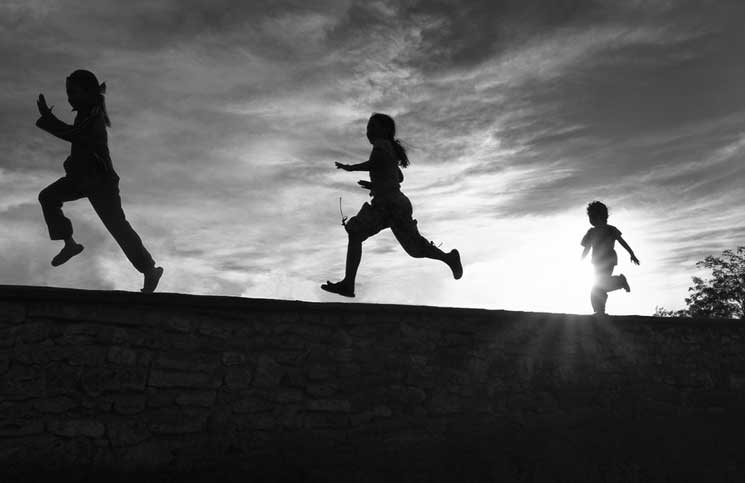Childhood is unarguably the best part of one’s life. We always look back and smile at our childhood and ponder how we have grown up and changed over the years. Childhood is the most beautiful of all seasons. It is like the spring season in one’s life.
The cradle is considered a symbol of happiness. Every family welcomes the newborn with gusto, for children’s playfulness and their mirth illuminate the house. Though we always think that they are naive and they are not aware of anything in the world (which is true), it does not mean that they are wrong always. In fact, their premonition is very strong. Children are sometimes, the best illustration of life’s most simple, yet most overlooked principles. The simplest of their actions can reveal so much about our own lives. The fact that they are blissfully unaware, yet totally in the moment is intriguing. Whether it is sleeping like an angel or smiling like a princess, adults can learn so many things from children, even though they we are older and know more about life. After all, it is the lesson that we learn that is more important, rather than from where or from whom we learn it.
We may come across many such instances where we suddenly stumble upon an idea and reflect on it, after observing kids. Then we realize the power of it. It is simple, yet sophisticated. This article tells you ten things you can learn from kids. Read on and be amazed!
10. Always ask for what you want
Children never hesitate to ask for what they think is rightfully theirs. In fact, they demand for it. If you break a promise you made, for instance, they demand an explanation and will not settle with just any excuse. But we adults sometimes don’t come forward and ask what we want, for the fear of rejection. We start thinking, “It won’t happen anyway. So why ask?” This is where we go wrong. What is the harm in putting forth our question or opinion? We are not entitled to be judged. We should be clear of this.
9. Fearlessness
Children always want to explore. Explore anything that’s beyond. And they are not afraid to do so. They are happy when they are let free. We should not restrict them too much. It curbs their enthusiasm. We can learn something very important from them, and that is to be bold. Be bold and take the step already! If you only think of the consequences, you will never begin and if you don’t take the first step, how will you complete the journey? In many situations, we may have to be bold and take things in our stride. Being fearless will itself sketch the right path for us.
8. Enjoy yourself and enjoy life
Kids always play pranks and have fun. Their innocent pranks make us smile. They enjoy being themselves and spread happiness to the people around them. They know how to enjoy life. Adults must draw this inspiration from kids. In the daily rush of activities, we forget to be ourselves. We forget our identity, amidst the clutter of life. The word ‘enjoy’ is no longer present in our lexicon. Why is that? Circumstances made us that way? No, it is just that we don’t enjoy and appreciate what comes our way. Only when we truly accept our life the way it is, will we learn to enjoy. Enjoying your life will give you truest satisfaction.One of the main differences between children and adults is that adults live in the mind, whereas children live in the heart: That is why they are so cheerful, optimistic and full of energy. The heart is the source of joy, love, peace and oneness. It is also the fount of spontaneity. Because children live in the heart, they are always spontaneous. They do not suffer from self-doubt and insecurity the way adults do. Children charm us precisely because they are all heart. They inspire us to go deep within and bring our own heart-qualities to the fore. This we can do through prayer and meditation. If we unearth our forgotten childlike heart we will discover true and lasting happiness.
7. Live for the moment
Yes, live for the moment. If you are unhappy now, just let it go with this moment and be happy from the next. Yes, keeping the sad and anxious emotions short term is good for our health and well being. Have you ever seen kids feeling bad about their past or worrying about the future? Probably not. It is something adults are accustomed to doing. Since the past was not perfect and over, and since the future is uncertain, it is the present that matters the most. You must make use of the present in the best possible way. Live in the moment. Live it fully.
One of the reasons children are often so happy is that they live fully in the present moment. When a child plays with a toy, his toy becomes his whole world. He has eyes for nothing else. As adults our mind is always roaming, thinking of the past or the future. Rarely it is in the here and now. But that’s where life is happening. Past and future are both illusions. As a wise person once wrote: “Yesterday is history. Tomorrow is a mystery. Today is a gift. That is why it is called the present.” Children teach us that happiness lies nowhere else but in the here and now.
Children are blessed with the ability to sleep well. We need such kind of sleep, where we forget all worries and just sleep!
6. Imagination, Enthusiasm and curiosity
Kids have really wild imagination. It is surprising because, from the little they see, they are able to imagine so much. Such is the power of their mind. They have a beautiful mind. A mind which is optimistic. A mind which fosters bold and unconventional ideas. We can guess how much they expect out of life from their lofty dreams. They are so hopeful of the future.
Kids are generally curious. They want to know what is behind the façade. They give keen attention to detail and sometimes ask questions, for which we may not have answers!
Being enthusiastic is another thing we can learn from them. The zest, the zeal and the verve with which they approach everything. Without enthusiasm and excitement, life does not have any charm. If we are hopeful, we will automatically be optimistic.
Kids don’t laze around, the way we do at times. They don’t adopt the sedentary lifestyle that we do. They are physically very active, always up to something. It would be very good for our health if we could be active too.Being enthusiastic is another thing we can learn from them. The zest, the zeal and the verve with which they approach everything. Without enthusiasm and excitement, life does not have any charm. If we are hopeful, we will automatically be optimistic.
5.To be free spirited and to be Innocent
Kids are free spirits. They are impulsive. They have no inhibitions whatsoever. They say what they feel and they are very expressive. But we start developing inhibitions as we grow older, just to fit into the mould cast by the society. Why are we depriving ourselves of the opportunity to express? Expression breeds creativity. It is better to be yourself, than try to pretend, just to be accepted by other people. Let your inner spirit fly out of the prison that is constructed by your negative thoughts. Don’t think, “What would they think of me?” Instead, just be yourself.
Little kids are very innocent. Innocence is a child’s best quality. Its silent sobs are just as adorable as its laughter. Children have no malice. They have a very clear conscience. They are so innocent that they cannot even think of violence or revenge. They don’t have a judgement of their own. They trust anyone who is nice to them. They are too young to start thinking. They are candid and straightforward. Although this doesn’t help always, it is actually good be non-judgemental and look at everyone the same way.
4. To give from the heart
You know how children when they are very young they don’t actually identify themselves with what we think they are, and when talking about themselves they usually do so in 3rd person: Dana’s doll, Dana’s dress, etc. They don’t say my dress, my doll until parents teach them to do so. Before that happens, and before they start identifying things as being theirs, they give and they share from the heart, everything with everyone and later on, we teach them to keep “their stuff” for themselves.
This is a lesson we definitely need to learn from them, knowing that when: “One man gives freely, yet gains even more; another withholds unduly, but comes to poverty.
3.To be trully Happy
Happiness comes from within. Children show this better than anyone else. They are always happy, no matter what. Their mirth brightens everyone around them. The way they burst into peals of laughter is something one cannot miss. Their cackle and their ever so cherubic smile can melt anyone’s heart. Indeed the best childhood years are also the best years of the parents’ lives.
What we have to learn is, to keep smiling all the time. To laugh and make others laugh. Being happy is the best thing you can gift yourself. If we carry our childhood with us, we never actually grow older!
2. Never give up!
When a child is learning how to walk, he takes a few steps and then falls down. Immediately he gets up, walks a few steps and falls down again. But although he may fall down a hundred times before he finally learns how to walk, the child does not feel that it has failed when it falls down. He knows that falling down is part of the process of learning how to walk. Because his so-called failures do not discourage him, the child continues trying until he is successful. We can all learn from this example by taking our so-called failures as stepping stones to our ultimate success. “Failure is the fast approaching train of the greatest success,” Sri Chinmoy wrote. If we take a “never give up” attitude, we can be successful in anything we undertake. Since we all learned how to walk, we all mastered this attitude at a very tender age. Let the child again be the father of the man.
Play the game of life
To children, everything is a game. And their game is played purely for enjoyment. Children are not concerned with winning or losing, they only want to have joy. By watching children play, we can learn something valuable: Life itself is a game in which we are the players. When we take life too seriously, we often suffer and feel miserable. But if we realize that life is a game, we can see things in perspective. The purpose of a game is not winning or losing, but playing well and having fun. So we will not be discouraged and depressed when we experience failure. And conversely, we will not be bloated with pride and arrogance if we are successful. We will take both failure and success as valuable experience, teaching us how to play the game of life well. Like children we will play for the sake of playing. Therein lies the secret key to enduring happiness.













